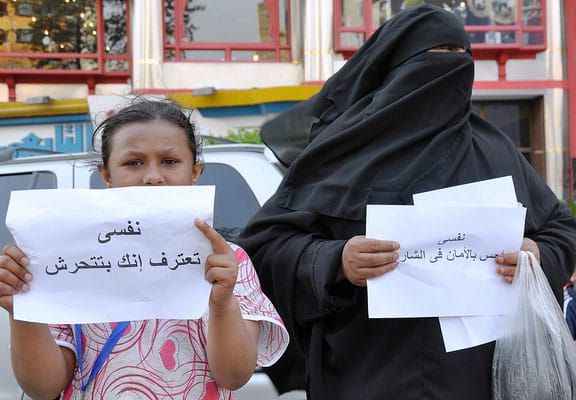

Credit: UN Women/Fatma Elzahraa Yassin on Flickr, under Creative Commons ;
(WOMENSENEWS)–In recent days, and repeatedly for the past few years, mobs of men have violently attacked women and girls taking part in demonstrations in Tahrir Square in Cairo. This time the attacks took place during celebrations of the election and inauguration of Egyptian President Abdel Fatah al-Sisi, the man now charged with ensuring safety for all Egyptians.
The inauguration attacks are just the tip of the iceberg. Sexual harassment and assault has become so rife that many women dread walking in public in Egypt.
Sisi has made public statements since the inauguration day attacks, which are a positive first step, but much more needs to be done. Turning the tide on sexual violence requires a comprehensive and coordinated approach that tackles all forms of violence against women.
After the attacks, Sisi instructed the interior minister to "take all necessary measures to combat sexual harassment," and even visited a victim of a sexual attack in the hospital to apologize, promising to hold the perpetrators accountable. Some arrests were made. An investigation was opened into one attack. A ministerial committee was formed and proposed plans that included increasing security for women in public squares and gatherings, as well as raising awareness through media campaigns and schools.
Two Narrow Amendments
On June 5, just days before the most recent spate of attacks, a decree about sexual harassment by the outgoing president, Adly Mansour, went into effect. The decree has been heralded as the "sexual harassment law," but it’s actually two narrow amendments to the existing penal code that define sexual harassment and increase the penalties.
If Sisi is serious about putting an end to the plague of sexual harassment and assault on Egypt’s streets, however, he needs to go beyond such measures. The new committee should develop a comprehensive, integrated approach, including legislation and a national strategy to protect women in Egypt from all forms of violence.
On June 9, Egyptian rights groups reported that there were at least 500 survivors of mob rape and mob sexual assault between February 2011 and January 2014, as well as thousands of women subjected to sexual harassment. Last year, Human Rights Watch documented epidemic sexual violence in Egypt, including at least 91 attacks between June 30 and July 3, 2013, during demonstrations, and the weak government response.
The 25 Egyptian rights groups that issued the June 9 statement called for a comprehensive law on violence against women and a national strategy to implement the newly approved laws. A comprehensive approach to violence against women is exactly what is needed.
Three Necessary Steps
This is what the Sisi government and the new committee should do:
First, enact further legal reforms. The penal code needs a comprehensive, modern definition of rape and a clear definition of sexual assault. The government should also enact legislation on all forms of violence against women that would address preventing violence and protecting and supporting survivors, including survivors of domestic violence.
Second, formulate a comprehensive national strategy on violence against women to implement the legislation. This should include a monitoring mechanism that reports to Parliament and national protocols and strategies for all relevant ministries. The authorities should consult with Egyptian women’s rights groups and survivors when drafting the strategy and any new legislation, and coordinate with all components of society in a position to raise awareness. A mechanism to fund the legislative reforms and strategy should be put in place.
Third, the government needs to develop protocols to ensure adequate medical and psycho-social support for victims of sexual assault. These should address confidentiality, dealing with trauma, referring victims for other services and providing timely treatment. Police and medical officials should be trained on all such protocols and laws.
The authorities can look to the United Nations Handbook for Legislation on Violence against Women, which sets out components on combating violence against women.
The Egyptian authorities are required to act–both under the Convention on the Elimination of All Forms of Discrimination against Women, to which Egypt is a state party, and Egypt’s new constitution–to protect "women against all forms of violence." As the assaults continue, the time to act is now.
Rothna Begum is a women’s rights researcher at Human Rights Watch. A version of this article first appeared on Mada Masr, an independent Egyptian news site
Would you like to Comment but not sure how? Visit our help page at https://womensenews.org/help-making-comments-womens-enews-stories.
Would you like to Send Along a Link of This Story? https://womensenews.org/story/sexual-harassment/140624/now-moment-egypt-turn-sex-assault-tide

